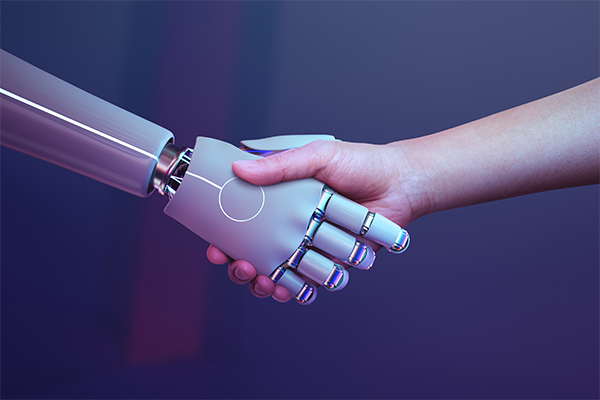Artificial Intelligence & Machine Learning
![]() Our Services
Our Services
Artificial Intelligence & Machine Learning Solutions
Overview: Artificial Intelligence (AI) and Machine Learning (ML) are transforming how businesses operate by automating processes, enabling predictive insights, and enhancing decision-making. By integrating AI and ML technologies, businesses can improve operational efficiency, drive innovation, and gain a competitive edge in their industry.

1. Development of AI-Driven Solutions to Enhance Operational Efficiency
AI-driven solutions focus on automating tasks, optimizing processes, and improving performance. By leveraging advanced algorithms and data analysis, businesses can streamline their operations, reduce human error, and increase productivity.
Key Features
Intelligent Process Automation (IPA):
- Automating repetitive and time-consuming tasks to free up valuable human resources for higher-level activities.
- AI-based decision-making systems that help in real-time operational adjustments, ensuring the smooth running of business processes.
Predictive Analytics for Operational Insights:
- AI models analyze historical data to forecast trends, identify bottlenecks, and suggest actionable insights for improvement.
- Real-time monitoring to identify and resolve inefficiencies, optimize workflows, and boost productivity.
Smart Resource Management:
- AI algorithms that dynamically allocate resources (personnel, equipment, etc.) based on demand and priorities, ensuring maximum operational efficiency.
- Demand forecasting and capacity planning using AI to reduce waste and ensure optimal performance.
Benefits:
- Reduced operational costs through automation.
- Improved accuracy and decision-making with AI-powered insights.
- Enhanced scalability and flexibility in operations.
2. Machine Learning Models for Predictive Analysis and Automation
Machine Learning (ML) leverages vast datasets to create models that predict outcomes, uncover trends, and automate processes. These models enable businesses to make data-driven decisions and enhance performance across various departments, from customer service to supply chain management.
Key Features
Predictive Analytics:
- Machine learning algorithms that predict future trends, customer behavior, product demand, and maintenance needs.
- AI-driven forecasting that helps businesses optimize inventory, staffing, and production planning based on predictions.
Automation of Routine Tasks:
- Automated workflows that adapt over time, improving the efficiency of processes such as customer interactions, data entry, and content curation.
- ML-based automation that continuously learns and improves its ability to handle tasks with increasing accuracy.
Anomaly Detection:
- ML models that detect unusual patterns in data, such as fraud detection in financial transactions or identifying system malfunctions in equipment.
- Early detection of issues before they become significant problems, reducing risk and preventing costly downtime.
Benefits:
- Enhanced decision-making with predictive models that deliver actionable insights.
- Increased efficiency and consistency through automation of repetitive tasks.
- Continuous improvement as models learn from new data and adapt over time.
3. Natural Language Processing (NLP) and Computer Vision Technologies
Natural Language Processing (NLP) and Computer Vision are two key components of AI that enable machines to interpret and understand human language and visual data. These technologies are transforming customer interactions, content analysis, and automation in industries ranging from healthcare to e-commerce.
Key Features
Natural Language Processing (NLP):
- NLP systems that enable businesses to analyze and understand customer interactions, sentiment analysis, and automate customer service through AI chatbots and virtual assistants.
- Text and speech recognition technologies that convert unstructured data into actionable insights (e.g., transcribing meetings, analyzing reviews, or extracting key information from documents).
Text Analysis and Sentiment Classification:
- Machine learning models that categorize and classify textual data, identifying sentiment (positive, negative, neutral) for customer feedback analysis, brand monitoring, and content moderation.
Computer Vision:
- AI-driven image and video analysis to automatically identify objects, faces, and text, enabling applications like facial recognition, quality control in manufacturing, or visual search in retail.
- Deep learning models for image enhancement, defect detection, and medical imaging analysis (e.g., identifying tumors or fractures from X-rays or MRI scans).
Automated Image and Video Processing:
- AI that processes and tags large volumes of visual data for applications such as surveillance, autonomous vehicles, and retail analytics.
- Use of AI to analyze video content in real-time, enabling applications like security monitoring or interactive customer experiences.
Benefits:
- Enhanced customer experiences through AI chatbots and voice assistants.
- Increased accuracy and speed of document processing, sentiment analysis, and text classification.
- Improved operational efficiency by automating image recognition and visual analysis.
Conclusion:
AI and Machine Learning are reshaping industries by enabling businesses to harness the power of data to make smarter decisions, optimize operations, and deliver superior customer experiences. From automation and predictive analytics to advanced NLP and computer vision, these technologies unlock new possibilities for operational efficiency, enhanced decision-making, and innovation. Whether you are looking to automate routine processes, predict future trends, or enhance customer interactions, AI and ML offer powerful solutions that can revolutionize your business.









